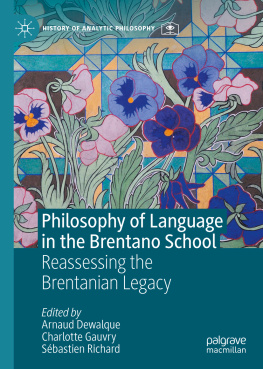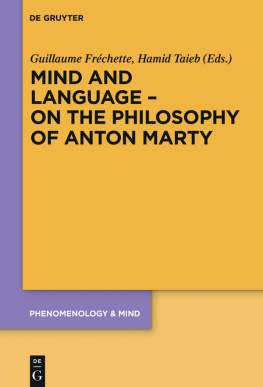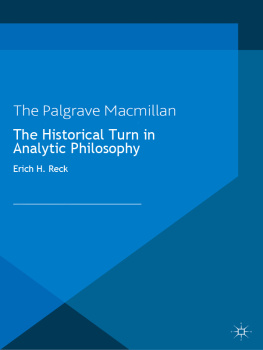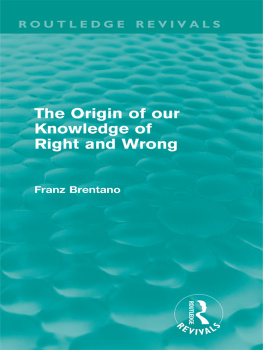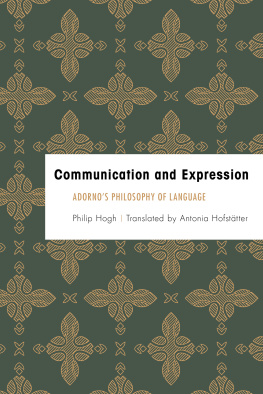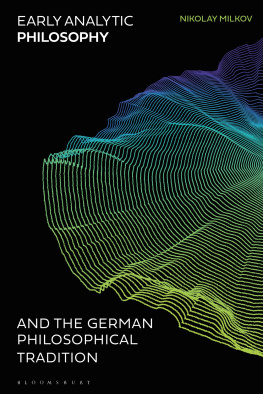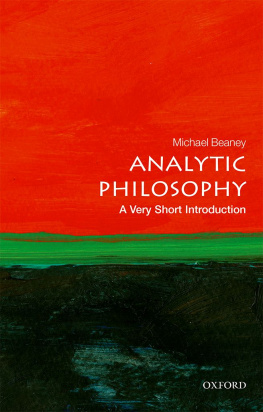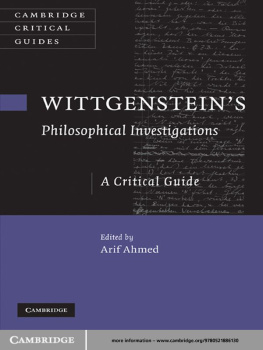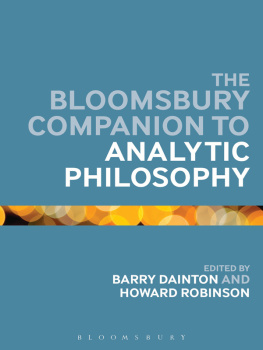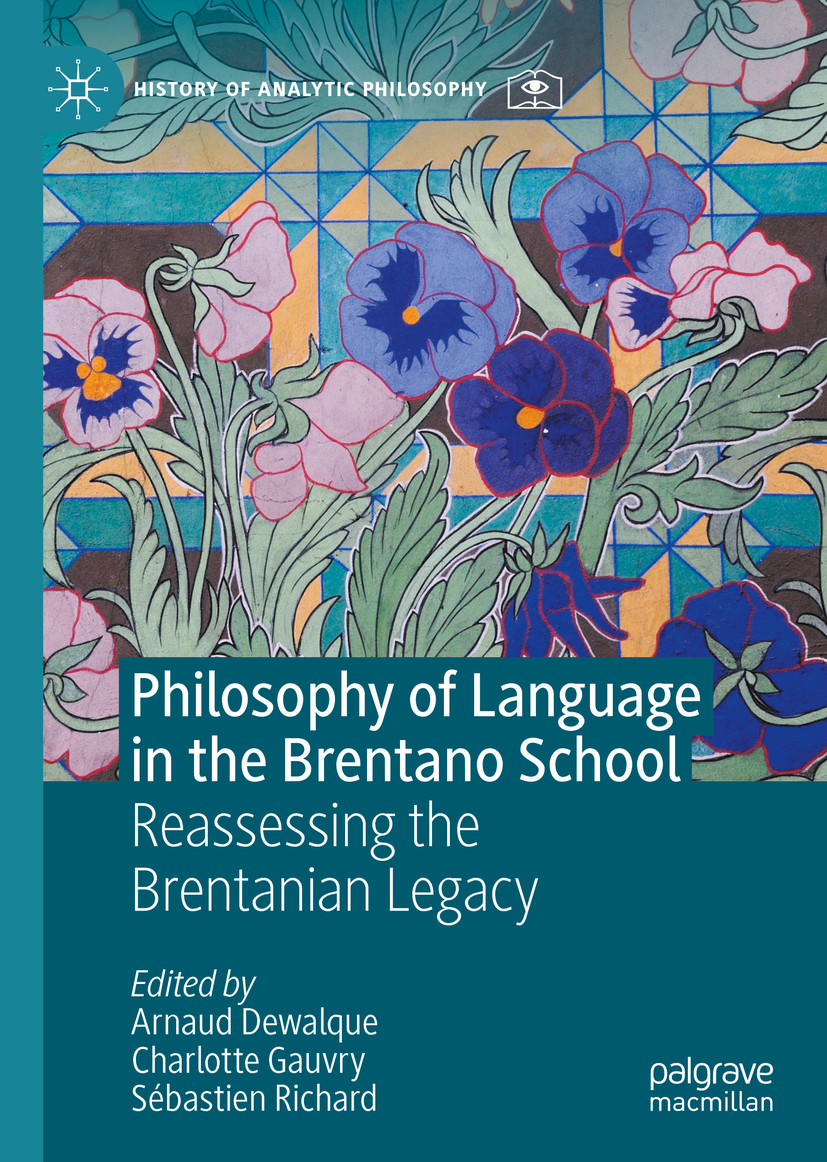History of Analytic Philosophy
Series Editor
Michael Beaney
Humboldt University Berlin, Kings College London, Berlin, Germany
Series Editor: Michael Beaney, Professor fr Geschichte der analytischen Philosophie, Institut fr Philosophie, Humboldt-Universitt zu Berlin, Germany, and Regius Professor of Logic, School of Divinity, History and Philosophy, University of Aberdeen, Scotland.Series editor: Michael Beaney, Professor fr Geschichte der analytischen Philosophie, Institut fr Philosophie, Humboldt-Universitt zu Berlin, Germany, and Regius Professor of Logic, School of Divinity, History and Philosophy, University of Aberdeen, Scotland.
Editorial BoardEditorial board members: Claudio de Almeida, Pontifical Catholic University at Porto Alegre, Brazil Maria Baghramian, University College Dublin, Ireland Thomas Baldwin, University of York, England
Stewart Candlish, University of Western Australia Chen Bo, Peking University, China Jonathan Dancy, University of Reading, England Jos Ferreirs, University of Seville, Spain Michael Friedman, Stanford University, USA Gottfried Gabriel, University of Jena, Germany Juliet Floyd, Boston University, USA Hanjo Glock, University of Zurich, Switzerland Nicholas Griffin, McMaster University, Canada Leila Haaparanta, University of Tampere, Finland Peter Hylton, University of Illinois, USA . Jiang Yi, Beijing Normal University, China Javier Legris, National Academy of Sciences of Buenos Aires, Argentina Cheryl Misak, University of Toronto, Canada Nenad Miscevic, University of Maribor, Slovenia, and Central European University, Budapest Volker Peckhaus, University of Paderborn, Germany Eva Picardi, University of Bologna, Italy Erich Reck, University of California at Riverside, USA Peter Simons, Trinity College, Dublin Thomas Uebel, University of Manchester, England.
Thomas Baldwin, University of York, England
Stewart Candlish, University of Western Australia
Chen Bo, Peking University, China
Jonathan Dancy, University of Reading, England
Jos Ferreirs, University of Seville, Spain
Michael Friedman, Stanford University, USA
Gottfried Gabriel, University of Jena, Germany
Juliet Floyd, Boston University, USA
Hanjo Glock, University of Zurich, Switzerland
Nicholas Griffin, McMaster University, Canada
Leila Haaparanta, University of Tampere, Finland
Peter Hylton, University of Illinois, USA
Jiang Yi, Beijing Normal University, China
Javier Legris, National Academy of Sciences of Buenos Aires, Argentina
Cheryl Misak, University of Toronto, Canada
Nenad Miscevic, University of Maribor, Slovenia, and Central European University, Budapest
Volker Peckhaus, University of Paderborn, Germany
Eva Picardi, University of Bologna, Italy
Erich Reck, University of California at Riverside, USA
Peter Simons, Trinity College, Dublin
Thomas Uebel, University of Manchester, England
More information about this series at http://www.palgrave.com/gp/series/14867
Editors
Arnaud Dewalque
Department of Philosophy, University of Lige, Lige, Belgium
Charlotte Gauvry
Department of Philosophy, University of Lige, Lige, Belgium
Sbastien Richard
Department of Philosophy, Free University of Brussels (ULB), Brussels, Belgium
ISSN 2634-5994 e-ISSN 2634-6001
History of Analytic Philosophy
ISBN 978-3-030-52210-0 e-ISBN 978-3-030-52211-7
https://doi.org/10.1007/978-3-030-52211-7
The Editor(s) (if applicable) and The Author(s), under exclusive license to Springer Nature Switzerland AG 2021
This work is subject to copyright. All rights are solely and exclusively licensed by the Publisher, whether the whole or part of the material is concerned, specifically the rights of translation, reprinting, reuse of illustrations, recitation, broadcasting, reproduction on microfilms or in any other physical way, and transmission or information storage and retrieval, electronic adaptation, computer software, or by similar or dissimilar methodology now known or hereafter developed.
The use of general descriptive names, registered names, trademarks, service marks, etc. in this publication does not imply, even in the absence of a specific statement, that such names are exempt from the relevant protective laws and regulations and therefore free for general use.
The publisher, the authors and the editors are safe to assume that the advice and information in this book are believed to be true and accurate at the date of publication. Neither the publisher nor the authors or the editors give a warranty, expressed or implied, with respect to the material contained herein or for any errors or omissions that may have been made. The publisher remains neutral with regard to jurisdictional claims in published maps and institutional affiliations.
AA World Travel Library / Alamy Stock Photo
This Palgrave Macmillan imprint is published by the registered company Springer Nature Switzerland AG.
The registered company address is: Gewerbestrasse 11, 6330 Cham, Switzerland
Series Editors Foreword
During the first half of the twentieth century, analytic philosophy gradually established itself as the dominant tradition in the English-speaking world, and over the last few decades, it has taken firm root in many other parts of the world. There has been increasing debate over just what analytic philosophy means, as the movement has ramified into the complex tradition that we know today, but the influence of the concerns, ideas and methods of early analytic philosophy on contemporary thought is indisputable. All this has led to greater self-consciousness among analytic philosophers about the nature and origins of their tradition, and scholarly interest in its historical development and philosophical foundations has blossomed in recent years, with the result that history of analytic philosophy is now recognized as a major field of philosophy in its own right.
The main aim of the series in which the present book appears, the first series of its kind, is to create a venue for work on the history of analytic philosophy, consolidating the area as a major field of philosophy and promoting further research and debate. The history of analytic philosophy is understood broadly, as covering the period from the last three decades of the nineteenth century to the start of the twenty-first century, beginning with the work of Frege, Russell, Moore, and Wittgenstein, who are generally regarded as its main founders, and the influences upon them, and going right up to the most recent developments. In allowing the history to extend to the present, the aim is to encourage engagement with contemporary debates in philosophy, for example, in showing how the concerns of early analytic philosophy relate to current concerns. In focusing on analytic philosophy, the aim is not to exclude comparisons with otherearlier or contemporarytraditions, or consideration of figures or themes that some might regard as marginal to the analytic tradition but which also throw light on analytic philosophy. Indeed, a further aim of the series is to deepen our understanding of the broader context in which analytic philosophy developed, by looking, for example, at the roots of analytic philosophy in neo-Kantianism or British idealism, or the connections between analytic philosophy and phenomenology, or discussing the work of philosophers who were important in the development of analytic philosophy but who are now often forgotten.

